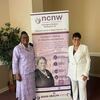Raising Awareness of Black babies’ Health in KNOWvember

Black Babies Awareness Month kicks off Nov. 1 to focus on the health of infants and toddlers.
The new campaign, which is led by the Equity Research Action Coalition at UNC-Chapel Hill, pushes to protect, promote, and preserve the wellbeing of Black families and babies. With 11.5 million Black children in the United States, more than 60% come from families with incomes below 200% of the federal poverty level, compared to 29% of their white peers.
“For every parent, our precious Black babies are our pride and joy, and they are more than deserving of the warm, safe, and nurturing caregiving that will contribute to their health and long-term brain development,” said Dr. Iheoma U. Iruka, founder of Equity Research Action Coalition. “We hope that Black Babies Awareness Month and the National Black Child Agenda together will build national public awareness around the issues that impact them the most, and lead to a concerted push for inclusive policies that will improve their life outcomes.”
The coalition also developed the National Black Child Agenda to eliminate structural racism and systemic inequities that can negatively affect the education and success of Black children. The agenda asserts that Black families are better supported when there are programs and interventions implemented based on cultural assets and the strengths of Black heritage. For instance, promoting economic security, health, access to early learning opportunities for kids, and on preserving cultural identity.
Studies suggest focusing on these issues can mitigate the biological and social vulnerability that Black families face because of racism and discrimination, and bias.
“When you think about it, our children exist in a duality of ‘the land of opportunity,’ and ‘the home of racism and debilitating inequities,’” said Dr. Leah Austin, president and CEO of National Black Child Development Institute. “This ground-breaking agenda reflects a post-2020 America and serves as a launchpad for empowering advocates and communities everywhere to better serve the needs of the 21st century Black child.”Based on research from the University of Oregon, protecting African American children and families from discrimination, racism, and material hardships is necessary for babies to thrive throughout their life.
Please support The Community Times by subscribing today!
You may also like:







